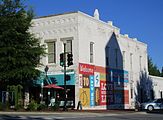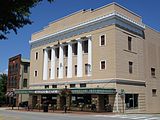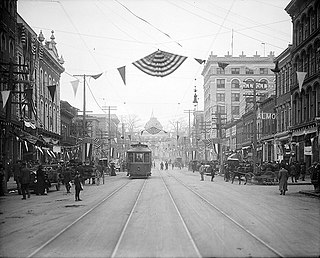
The Fayetteville Street Historic District in Raleigh, North Carolina is a historic district listed on the National Register of Historic Places (NRHP). The District includes the 100–400 blocks of Fayetteville Street, the 00–100 blocks of the south side of West Hargett Street, the 00 block of the north side of West Martin Street, and the 100–400 blocks of South Salisbury Street.
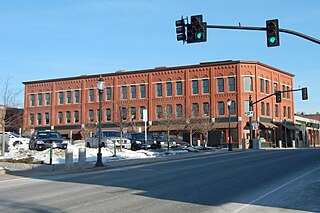
The Masonic Block is an historic commercial block in Reading, Massachusetts. This three-story brick building is distinctive in the town for its Renaissance Revival styling. It was built in 1894 by the local Reading Masonic Temple Corporation, and housed the local Masonic lodge on the third floor. The building was listed on the National Register of Historic Places in 1984.

Tifton Commercial Historic District, in Tifton in Tift County, Georgia, is a historic district that was listed on the National Register of Historic Places (NRHP) in 1986 and expanded in 1994. The original listing was portions of 10 blocks including buildings from the 1890s to the late 1930s, most built of brick.

There are nine historic districts in Meridian, Mississippi. Each of these districts is listed on the National Register of Historic Places. One district, Meridian Downtown Historic District, is a combination of two older districts, Meridian Urban Center Historic District and Union Station Historic District. Many architectural styles are present in the districts, most from the late 19th century and early 20th century, including Queen Anne, Colonial Revival, Italianate, Art Deco, Late Victorian, and Bungalow.
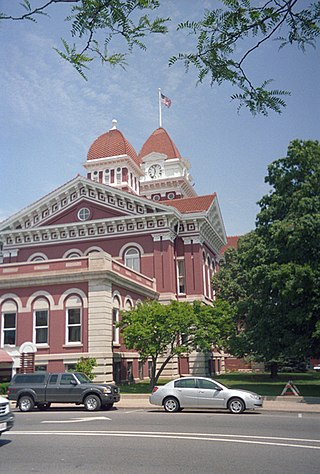
Crown Point Courthouse Square Historic District is a historic district in Crown Point, Indiana, that dates back to 1873. It was listed on the National Register of Historic Places in 2004. Its boundaries were changed in 2005, and it was increased in 2007 to include a Moderne architecture building at 208 Main Street. The late nineteenth- and early twentieth-century commercial and public buildings represent a period of economic and political growth. The Lake County Courthouse stands in the center of the district. Designed by architect John C. Cochrane in 1878, this brick building is a combination of Romanesque Revival and Classical styles. Enlarged in 1909 with the addition of north and south wings, designed by Beers and Beers. Continued growth in the county required second enlargement in 1928. This local landmark was placed in the National Register of Historic Places in 1973.

This is a list of the National Register of Historic Places listings in Lyon County, Minnesota. It is intended to be a complete list of the properties and districts on the National Register of Historic Places in Lyon County, Minnesota, United States. The locations of National Register properties and districts for which the latitude and longitude coordinates are included below, may be seen in an online map.

The Downtown Adrian Commercial Historic District is a historic district comprising the downtown area of Adrian, Michigan. It was designated as a Michigan Historic Site and added to the National Register of Historic Places on April 17, 1986. The district is roughly bounded on the north by Toledo Street, on the east by North Broad Street, on the south by East Church Street, and on the west by North Winter Street (M-52), West Maumee Street, and the River Raisin. Most of the district is enclosed by the US-223 Business Route, although the two are not conterminous.
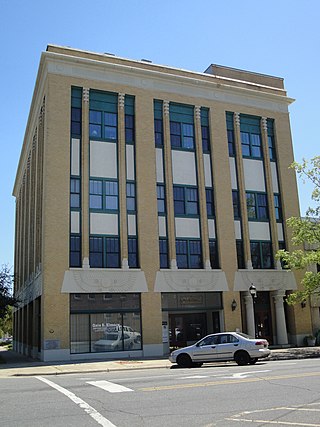
The Masonic Temple is a historic Masonic Lodge and office building located at Shelby, Cleveland County, North Carolina. It was built in 1924–1925, and is a four-story, rectangular, brushed brick building. It is in the Egyptian Revival style with massive concrete lintels at the first story, robust lotiform pillars at the building's principal entrance, and a richly ornamented cornice frieze. It was commissioned by the Cleveland Lodge of the Ancient, Free, and Accepted Masons of North Carolina. Today, no Masonic lodges meet in the building.

The Masonic Temple is a historic Masonic Lodge building located at Parkersburg, Wood County, West Virginia. It was built in 1915, and is a three-story, three-bay wide, red brick building with stone trim in the Classical Revival style. It features elliptical bays flanking the central bay on the front facade. The building was designed by Columbus architect Frank Packard with local supervising architect Theodore T. Sansbury.
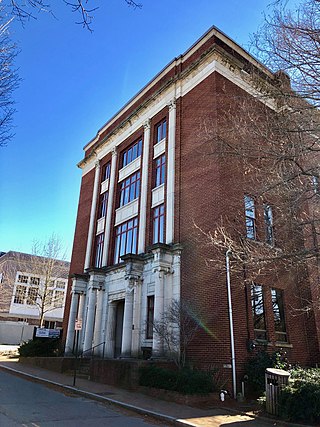
The Masonic Hall in Waynesville, North Carolina is a historic Masonic Lodge constructed in 1927 as a meeting hall for a local area Masonic Lodge.

The Barre Downtown Historic District encompasses the historic commercial and civic heart of the city of Barre, Vermont. Extending along Main Street from City Park to Depot Square, this area was developed quite rapidly in the 1880s and 1890s, when the area experienced rapid growth due to the expansion of the nearby granite quarries. It was listed on the National Register of Historic Places in 1979.
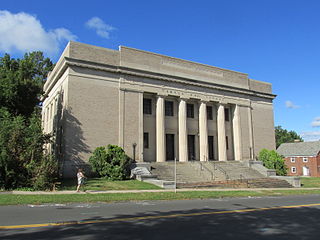
Walter Percival Crabtree was an American architect who worked in Connecticut. Some of his works are listed on the National Register of Historic Places. Crabtree was a native of Rochester, New York. He "received architectural training at Holyoke, Massachusetts, later moving to New Britain, where he was employed in the office of W.H.Cadwell, a well-known local architect", from 1901 to 1904. He worked on his own in New Britain from 1905 to 1928, and then in Hartford from then to 1942. He designed numerous business block buildings and private houses in New Britain and Hartford as well as in the surrounding areas.
Downtown Asheville Historic District is a national historic district located at Asheville, Buncombe County, North Carolina. The district encompasses about 279 contributing buildings and one contributing object in the central business district of Asheville. It includes commercial, institutional, and residential buildings in a variety of popular architectural styles including Colonial Revival, Queen Anne, and Art Deco.

Central Shelby Historic District is a national historic district located at Shelby, Cleveland County, North Carolina. It encompasses 229 contributing buildings in the central business district and surrounding residential areas of Shelby. The district is centered on the Cleveland County Courthouse (1907) and public square, established in 1841. The district includes representative examples of Colonial Revival and Bungalow / American Craftsman architectural styles. The district includes the separately listed courthouse, Masonic Temple Building, and Webbley. Other notable buildings include the Webb House, Wells House, Fulenwider-Ebeltoft House, Dr. S. S. Royster House, Bateman House, Washburn Block, city hall and firehouse (1911), Royster Building (1910), First Baptist Church, Ascension Lutheran Church (1932), and Southern Railway Freight Depot.

The St. Johnsbury Historic District encompasses much of the historic civic and commercial center of St. Johnsbury, Vermont. Representing a significant expansion of the Railroad Street Historic District and the St. Johnsbury Main Street Historic District, it captures the historical tension and competition between Main Street and Railroad Street for primacy as the town's most important civic and commercial areas. The district was listed on the National Register of Historic Places in 1980.

The Downtown Cheyenne Historic District in Cheyenne, Wyoming is a historic district that was listed on the National Register of Historic Places in 1978. It is an area of about seven blocks, in the core of the original business district of Cheyenne, and home of many of the first masonry commercial buildings in Cheyenne.

The Frankfort Commercial Historic District in Frankfort, Kentucky is a 24 acres (9.7 ha) historic district which was listed on the National Register of Historic Places in 1979. It included 86 contributing buildings and one contributing structure.

The Riverside Avenue Historic District is a 16.5 acres (6.7 ha) historic district in Downtown Spokane, Washington consisting of buildings constructed in the early 20th century, and was listed on the National Register of Historic Places in 1976. The listing includes 14 contributing properties, nine of which are considered primary and five are considered secondary.

The Ardmore Historic Commercial District, in Ardmore, Oklahoma, is a 19 acres (7.7 ha) historic district which was listed on the National Register of Historic Places in 1983.












